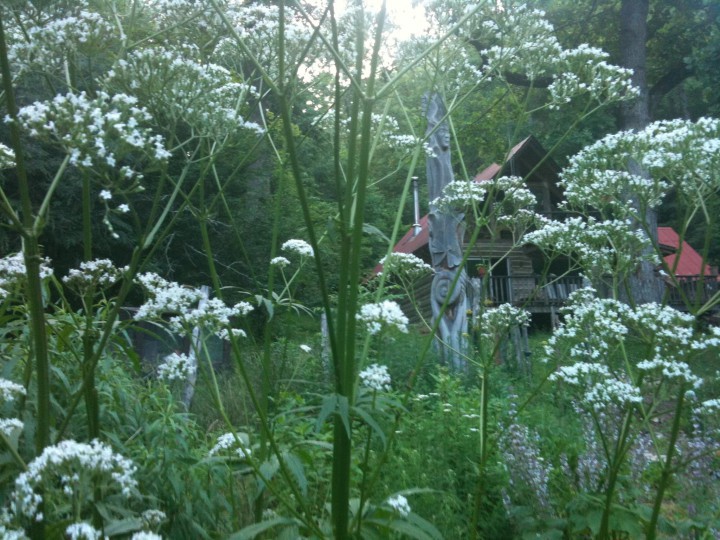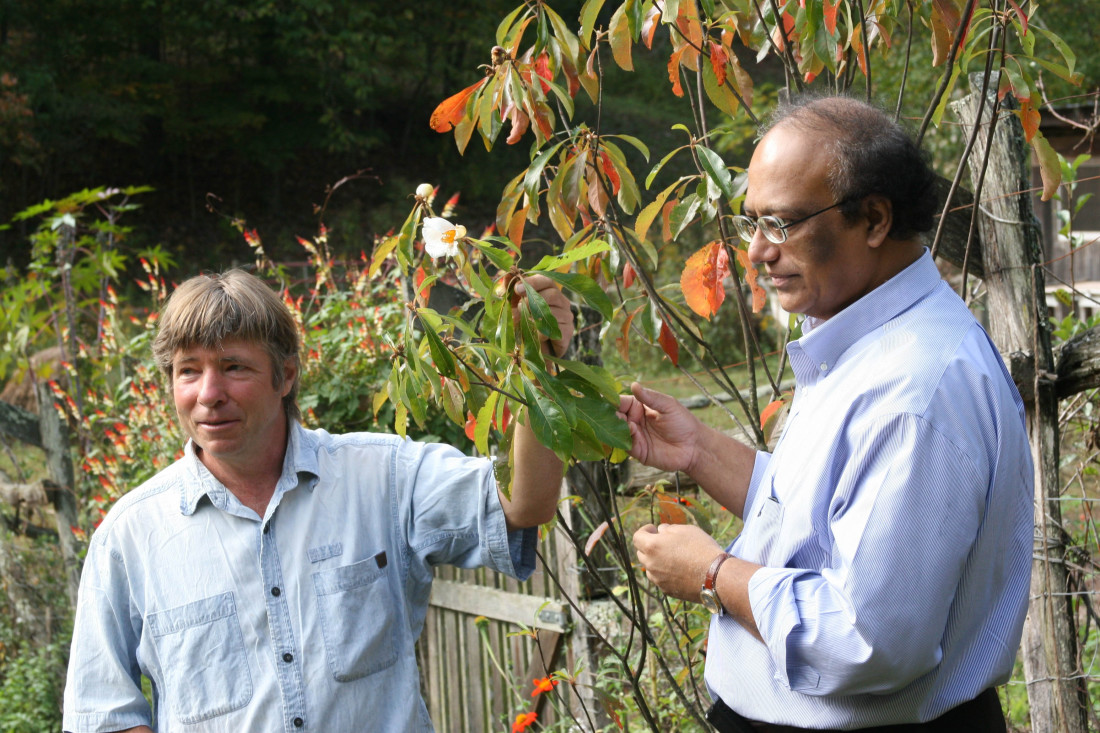Using herbs native to the region, Appalachian folk medicine is very much alive today. Its healing practices have trickled down from mountain folk to modern mainstream providers.
One of them is Dr. Hassan Amjad, founder and director of the Jafary Clinic and Academy of Herbal Medicine in West Virginia. He’s presenting a half-day conference — “Beyond Slippery Elm and Buzzard Grease: A Guide to Folk Medicine of Appalachia” — on Friday, June 24, at the Mountain Area Health Education Center in Asheville. Folk medicines can work with the prevailing medical system, he says.
“Herbal medicine has been around for millennia, yet during the last 100 years, this way of healing has been overlooked and often dismissed as quackery.” That’s because millions can be made from pharmaceuticals, says Amjad, who calls himself a naturalist and medical botanist. “In many cases, herbal medicines are superior to pharmaceuticals, without side effects, and far less expensive for the patient.”
Herbalism focuses on prevention and addressing root causes rather than symptoms, says Amjad. In the face of a corporate medical system that favors expensive interventions and costly medicines, Amjad advocates using herbal remedies. At the Jafary Clinic, he teaches people how to recognize and use a wide variety of herbs from around the world to promote good health, wellness and chronic disease prevention.
At the conference, Amjad will relate the impact of folk medicines from around the world, such as Irish, Welsh and German traditions, on Appalachian culture. “Most countries honor and revere their traditional medicines. China has traditional Chinese medicine, Japan has kampo, Indonesia has jamu, India has ayurveda and Pakistan has unanni,” says Amjad.
He might not be the typical expert on Appalachian folk medicine. Far from growing up in the back woods of these mountains, Amjad comes from Pakistan, where his grandmother was a respected herbalist.
Indeed, our great-grandmothers practiced their indigenous healing traditions throughout the world, before the advent of today’s high-tech, costly, pharmaceutical and surgery-oriented medicine enshrined in huge hospitals, says Amjad. “Folk medicine exists worldwide, like a quilt made with patches from all over the world, a beautiful diverse mosaic.”
For the June 24 event, Amjad will give many examples of Appalachian plants with medicinal uses, such as dandelion root for obesity, fennel seeds for high blood pressure, ginkgo biloba for rheumatoid arthritis and fenugreek for diabetes. He points out that slippery elm not only treats sore throat but also gastritis. Goldenseal, says Amjad, is an antibiotic as well as a treatment for peptic ulcers.
How did Amjad become so knowledgeable about folk medicine? He lived in West Virginia for 38 years, including two decades learning traditional remedies from the region’s elders. One of those elders was the legendary herbalist “Mr. Catfish” (Clarence Frederick Gray). This traditional healer understood the power of ginseng for treating fibromyalgia, arthritis, chronic fatigue and chronic lung disease, he says. The old healer also used bitters, a mixture of herbs that promote healthy digestion.
Amjad wrote about Mr. Catfish in one of his many books, Life and Thymes of an Appalachian Herbalist.
“Health care in America is totally broken. It’s too expensive, and the system is corrupt,” says Amjad, who has earned eight specialty diplomas in medicine, including nutritional anthropology and evolutionary biology. He also holds two university professorships. “Medicine has become a commodity. It is really time for change,” says Amjad.
“There are simple cures, and you don’t need expensive methods to treat common ailments. People need a choice. I would like to see herbal remedies taught in high schools,” he says. “People learn how to fix a broken car, but they go to the emergency room for common conditions they could treat themselves with herbs.” Many of Amjad’s patients cannot afford prescriptions, he notes, so he frequently creates herbal remedies and gives them to his patients for free.
Amjad also says that folk traditions are dying out because of urbanization and the paucity of traditional healers. His goal is to create a museum for Appalachian folk medicine since it’s primarily an oral tradition.
Registered nurse Elaine Alexander is MAHEC’s director of continuing education for the department of nursing, and she invited Amjad to speak at the June 24 conference. Echoing his words about the staying power of folk medicine traditions, she says, “My grandmother was from England, and I still rely on many of the remedies she taught me, such as nutmeg in milk for a sty in the eye or ginger for an upset stomach.”

Since folk medicine exists alongside modern medicine these days, says Alexander, sometimes people don’t let their physicians know they are taking old-time remedies. Those treatments may interact positively or negatively with modern pharmaceuticals, so it’s important for physicians to know, she says. Noting the importance of frontline medical workers, patients will often feel more comfortable talking with their nurses and certified nursing assistants, Alexander adds.
“I hope that physicians, nurses and other medical people, as well as the general public, will attend this workshop,” she says.
For those interested in a local resource, the Appalachian School of Holistic Herbalism in West Asheville, the Southeast’s oldest herbal studies center, carries on the region’s traditions by training students. “The Appalachian folk tradition involves using what you have, being self-sufficient and showing respect for what sustains you and your children,”says Ceara Foley, the school’s director.
“ASHH teaches students the traditions of the Cherokee, who practiced ethical principles of woodlands harvesting: See the plant four times before you harvest, ask permission of the plant, honor it, give thanks and make an offering, and always leave other plants for future generations,” Foley says.
The school cultivates many native herbs, too, such as ginseng, goldenseal, Solomon seal, blue cohosh, black cohosh and bloodroot, she says, and “wildcrafts” others by harvesting them sustainably from the woods.
At ASHH, over 250 dried herbs and extracts, plus herbal oils, vinegars and honeys, are available, and trained herbalists offer consults, according to Foley.
“Herbal remedies are widely used and locally produced. We can all benefit,” she says.
WHAT: “Beyond Slippery Elm and Buzzard Grease: A Guide to Folk Medicine of Appalachia” with Dr. Hassan Amjad
WHERE: MAHEC, Mary C. Nesbitt Biltmore Campus, 121 Hendersonville Rd.
WHEN: Friday, June 24, 8 a.m.-12:15 p.m.
REGISTRATION: Open to medical professionals and the general public: registration@mahec.net or 828-257-4475.
MORE INFO
Mountain Area Health Education Center: mahec.net
Dr. Hassan Amjad: jmcnaturalmedicine.com
Appalachian School of Holistic Herbalism: herbsheal.com




Before you comment
The comments section is here to provide a platform for civil dialogue on the issues we face together as a local community. Xpress is committed to offering this platform for all voices, but when the tone of the discussion gets nasty or strays off topic, we believe many people choose not to participate. Xpress editors are determined to moderate comments to ensure a constructive interchange is maintained. All comments judged not to be in keeping with the spirit of civil discourse will be removed and repeat violators will be banned. See here for our terms of service. Thank you for being part of this effort to promote respectful discussion.